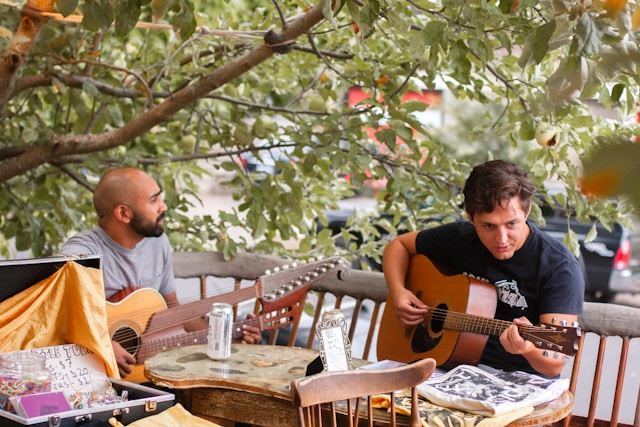How to make friends as an adult
Making friends and deepening existing relationships can be difficult, Learn more about how to overcome some of the barriers that may be getting in your way.

Building meaningful relationships is an important part of maintaining good mental health and improving your resilience to stressful events. Having too few relationships, or feeling dissatisfied with the depth and quality of your relationships, can lead to loneliness. If you are lonely a lot, you may find that making friends and strengthening your relationships improves your quality of life. As we get older, the dynamic of our relationships can change, and you may find that you do not have as many friendships and you have had at other times in your life. This is a common experience, and if you are looking to make new friends, there are always ways to do so.
How can I make meaningful friendships?
There are things outside of your control that may stop you from deepening relationships or forming new connections. Experiencing discrimination, stigma, social exclusion, bullying, chronic illness or disability, poverty, and housing insecurity can impact your ability to make friends.
Our view of ourselves can also impact our ability to form and keep meaningful relationships.
Feelings that can cause challenges when building relationships can include:
- Low self-esteem
- Believing you are somehow lesser than others because of your identity
- Thinking that you are lonely because you are not worthy of friendship or deeper connection
- Anxiety, including social anxiety disorder
- Fear of vulnerability or rejection
- Difficulty trusting others due to past traumatic experiences
Recognising these challenges can be a first step towards finding ways to build more meaningful relationships.
What can I do to make friends and deepen relationships?
Improve your self-esteem
Having low self-esteem or viewing yourself in an overly negative light can get in the way of forming meaningful relationships. You may fear being rejected or think that you are not worthy of friendship, but these thoughts are not true. You deserve real friendship in your life. Research has shown that stressful childhood events, such as ongoing conflict between your parents, bullying, or financial instability, can reduce your level of resilience (i.e., ability to bounce back after difficult experiences) and increase your risk of loneliness.
Loneliness tends to be connected not only with lower self-esteem but lower self-efficacy. Self-efficacy is the belief in your ability to succeed and achieve goals. These thoughts can also impact your confidence in forming meaningful friendships. Having confidence in your ability to succeed and tackle challenges can protect loneliness and support you in making friends.
Working on improving your self-esteem and your self-efficacy can be a crucial step in building relationships where you can feel free to express who you are.
Challenge negative cultural stereotypes and norms
Negative stereotypes and stigmatising attitudes towards minoritised groups, such as LGBTQI+ communities and racial/ethnic minorities, can create challenges when forming meaningful relationships. Discrimination and social exclusion can cause social isolation, making it difficult to form friendships. Believing these negative beliefs can lead to feelings of low self-worth. You may find yourself putting up with relationships that don’t meet your emotional needs or allow you to fully be yourself because you do not think you deserve better, but you do.
When these negative beliefs are internalised, especially regarding race, it is referred to as internalised racism, and it can reinforce the effects of social exclusion and marginalisation. Society still has a lot of work to do to challenge negative stereotypes and beliefs and to prevent these beliefs from harming individuals in minoritised groups. While this societal context is important to consider, you can also try yourself to challenge these internalised beliefs as an important step toward building the supportive, fulfilling relationships you deserve.
Read more about the effects of racism on health and mental health.
Challenging negative beliefs about yourself
When you’re lonely, you may focus on potential signs of rejection in social situations or interpret them negatively. Thinking negatively about how people view you in social situations can make it harder to form meaningful friendships. For example, you may believe you struggle to make friends due to an issue with you, rather than the fact that you don’t live close to other people you can connect with. Often, there are structural reasons you may feel lonely which are outside of your control, such as poor transport links, or a lack of shared outdoor space in which to socialise. While you cannot control those factors, you can address your thought patterns through approaches like cognitive-behavioural therapy (CBT). CBT has been shown to improve how a person manages loneliness and interprets social situations.
Learn more about common thought patterns and how to change them.
Managing anxiety
Loneliness is often linked to social anxiety. If you feel very nervous, worried, or otherwise upset in most or all social situations, it’s important to seek mental health support. Addressing social anxiety can help reduce loneliness by providing coping strategies that can help lessen your avoidance of social interactions and make them more enjoyable.
Learn more about social anxiety disorder.
Working with the right counsellor can help
Working with a counsellor or psychotherapist can be very helpful in addressing some of the common challenges involved in building and strengthening relationships. However, counselling can also bring up difficult emotions like shame, anger, or feelings of blame. It’s important to approach this process with self-compassion, acknowledging your own value. A counsellor or psychotherapist who you feel safe with can guide you through this process. They can also help you develop coping strategies for the physical and mental health effects of ongoing social exclusion or discrimination—factors that can have a significant impact on your relationships and overall well-being.
Learn more about inclusive psychotherapy and how to find an inclusive psychotherapist.
Reaching out to existing friends
Sometimes, building friendships isn’t about meeting new people; it’s about reconnecting with those already in your life. If you haven’t seen someone in a while or feel like you’ve drifted apart, reaching out can make a difference.
Investing time in relationships can feel daunting, especially when you’re juggling multiple responsibilities, like work, education, and caregiving. However, maintaining a connection does not always have to involve making big plans. A simple message to check in, suggest meeting up, or share something that reminded you of them can help rebuild the connection.
Joining clubs and groups to make friends
Joining a club, group, or activity you enjoy can be a great way to meet new people who share your interests. Whether it’s a sports team, a book club, a gaming group, or a local community project, being part of something can make it easier to start conversations and build friendships naturally. When you’re doing something you enjoy, connections often form without pressure, and over time, those shared experiences can turn into meaningful friendships.
Feeling overwhelmed and want to talk to someone?
- Get anonymous support 24/7 with our text message support service
- Connect with a trained volunteer who will listen to you, and help you to move forward feeling better
- Whatsapp us now or free-text SPUNOUT to 50808 to begin.
- Find out more about our text message support service
If you are a customer of the 48 or An Post network or cannot get through using the ‘50808’ short code please text HELLO to 086 1800 280 (standard message rates may apply). Some smaller networks do not support short codes like ‘50808’.






